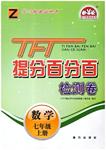题目内容
If we _______ to him, he will make further demands.
- A.give up
- B.give away
- C.give out
- D.give way
解析:考查动词短语。give up"放弃” give away"捐赠,分发” give out“放出,用完”give way"让步” 选D。

 提分百分百检测卷系列答案
提分百分百检测卷系列答案 宝贝计划期末冲刺夺100分系列答案
宝贝计划期末冲刺夺100分系列答案 能考试全能100分系列答案
能考试全能100分系列答案Mark Twain has been called the inventor of the American novel. And he surely deserves additional praise: the man who popularized the clever literary attack on racism.
I say clever because anti-slavery fiction had been the important part of the literature in the years before the Civil War. H. B. Stowe’s Uncle Tom’s Cabin is only the most famous example. These early stories dealt directly with slavery. With minor exceptions, Twain planted his attacks on slavery and prejudice into tales that were on the surface about something else entirely. He drew his readers into the argument by drawing them into the story.
Again and again, in the postwar years, Twain seemed forced to deal with the challenge of race. Consider the most controversial, at least today, of Twain’s novels, Adventures of Huckleberry Finn. Only a few books have been kicked off the shelves as often as Huckleberry Finn, Twain’s most widely read tale. Once upon a time, people hated the book because it struck them as rude. Twain himself wrote that those who banned the book considered the novel “trash and suitable only for the slums (贫民窟).” More recently the book has been attacked because of the character Jim, the escaped slave, and many occurences of the word nigger. (The term Nigger Jim, for which the novel is often severely criticized, never appears in it.)
But the attacks were and are silly—and miss the point. The novel is strongly anti-slavery. Jim’s search through the slave states for the family from whom he has been forcibly parted is heroic. As J. Chadwick has pointed out, the character of Jim was a first in American fiction—a recognition that the slave had two personalities, “the voice of survival within a white slave culture and the voice of the individual: Jim, the father and the man.”
There is much more. Twain’s mystery novel Pudd’nhead Wilson stood as a challenge to the racial beliefs of even many of the liberals of his day. Written at a time when the accepted wisdom held Negroes to be inferior (低等的) to whites, especially in intelligence, Twain’s tale centered in part around two babies switched at birth. A slave gave birth to her master’s baby and, for fear that the child should be sold South, switched him for the master’s baby by his wife. The slave’s lightskinned child was taken to be white and grew up with both the attitudes and the education of the slave-holding class. The master’s wife’s baby was taken for black and grew up with the attitudes and intonations of the slave.
The point was difficult to miss: nurture (养育), not nature, was the key to social status. The features of the black man that provided the stuff of prejudice—manner of speech, for example— were, to Twain, indicative of nothing other than the conditioning that slavery forced on its victims.
Twain’s racial tone was not perfect. One is left uneasy, for example, by the lengthy passage in his autobiography (自传) about how much he loved what were called “nigger shows” in his youth—mostly with white men performing in black-face—and his delight in getting his mother to laugh at them. Yet there is no reason to think Twain saw the shows as representing reality. His frequent attacks on slavery and prejudice suggest his keen awareness that they did not.
Was Twain a racist? Asking the question in the 21st century is as wise as asking the same of Lincoln. If we read the words and attitudes of the past through the “wisdom” of the considered moral judgments of the present, we will find nothing but error. Lincoln, who believed the black man the inferior of the white, fought and won a war to free him. And Twain, raised in a slave state, briefly a soldier, and inventor of Jim, may have done more to anger the nation over racial injustice and awaken its collective conscience than any other novelist in the past century.
【小题1】 How do Twain’s novels on slavery differ from Stowe’s?
| A.Twain was more willing to deal with racism. |
| B.Twain’s attack on racism was much less open. |
| C.Twain’s themes seemed to agree with plots. |
| D.Twain was openly concerned with racism. |
| A.target readers at the bottom |
| B.anti-slavery attitude |
| C.rather impolite language |
| D.frequent use of “nigger” |
| A.Jim’s search for his family was described in detail. |
| B.The slave’s voice was first heard in American novels. |
| C.Jim grew up into a man and a father in the white culture. |
| D.Twain suspected that the slaves were less intelligent. |
| A.slaves were forced to give up their babies to their masters |
| B.slaves’ babies could pick up slave-holders’ way of speaking |
| C.blacks’ social position was shaped by how they were brought up |
| D.blacks were born with certain features of prejudice |
| A.The attacks. | B.Slavery and prejudice. |
| C.White men. | D.The shows. |
| A.Twain had done more than his contemporary writers to attack racism. |
| B.Twain was an admirable figure comparable to Abraham Lincoln. |
| C.Twain’s works had been banned on unreasonable grounds. |
| D.Twain’s works should be read from a historical point of view. |
 rouble until t troubles you.
rouble until t troubles you.